|
|
|
Sort Order |
|
|
|
Items / Page
|
|
|
|
|
|
|
| Srl | Item |
| 1 |
ID:
080824
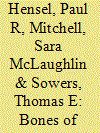

|
|
|
|
|
| Publication |
2008.
|
| Summary/Abstract |
Contentious issues are important sources of militarized conflict. This article advances an issue-based approach to world politics, focusing on disagreements over territory, maritime zones, and cross-border rivers. We characterize militarized conflict and peaceful techniques as substitutable foreign policy tools that states can adopt to resolve disagreements over issues, and we present hypotheses to account for issue management based on issue salience and recent interaction over the same issue. Empirical analyses reveal that states are more likely to use both militarized conflict and peaceful methods when the issue at stake is more salient, both when the general issue type is considered more salient and when the specific issue under contention has greater within-issue salience. Recent issue management also plays an important role, as histories of both militarized conflict and failed peaceful settlements increase pressure to take further action to settle the issue
|
|
|
|
|
|
|
|
|
|
|
|
|
|
|
|
| 2 |
ID:
175511
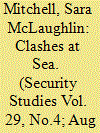

|
|
|
|
|
| Summary/Abstract |
Maritime disputes feature prominently in global politics, but we lack full understanding about how they arise and why they are militarized. China’s maritime conflicts with neighboring states (for example, Senkaku/Diaoyu, Spratly Islands) have generated over a dozen militarized clashes at sea since 1991. Confrontations in the Kerch Strait between Russia and Ukraine in November 2018 created similar concerns about the escalation of the situation to interstate war. Maritime diplomatic clashes are frequent; the Issue Correlates of War Project identifies 270 dyadic diplomatic claims over maritime areas globally from 1900 to 2010, with close to a third of these disagreements becoming militarized. This paper explores why countries experience diplomatic disagreements over maritime zones, why some maritime claims are militarized, and how countries can peacefully resolve these conflicts. The project is situated theoretically in the issue approach to world politics. Empirical analyses show that maritime areas with more salient resources (oil, fish stocks, minerals, etc.) and previous militarization become more violent on average. States with greater naval capabilities make more claims to offshore maritime areas and use more coercive strategies unless they face countries with similar naval strength. Unlike territorial disputes, maritime conflicts are more likely to occur between democratic, developed states and are more successfully settled through multilateral institutions. The findings show the conditions under which maritime claims may become a flashpoint for broader clashes at sea between major powers.
|
|
|
|
|
|
|
|
|
|
|
|
|
|
|
|
| 3 |
ID:
178651


|
|
|
|
|
| Summary/Abstract |
Many scholars examine the relationship between climate variability and intrastate conflict onset. While empirical findings in this literature are mixed, we know less about how climate changes increase the risks for conflicts between countries. This article studies climate variability using the issue approach to world politics. We examine whether climate variability influences the onset and militarization of interstate diplomatic conflicts and whether these effects are similar across issues that involve sovereignty claims for land (territory) or water (maritime, river). We focus on two theoretical mechanisms: scarcity (abundance) and uncertainty. We measure these concepts empirically through climate deviation (e.g. droughts/floods, heat waves/cold spells) and climate volatility (greater short-term variance in precipitation/temperature). Analyses of issue claims in the Western Hemisphere and Europe (1901–2001) show that greater deviations and volatility in climate conditions increase risks for new diplomatic conflicts and militarization of ongoing issues and that climate change acts as a trigger for revisionist states.
|
|
|
|
|
|
|
|
|
|
|
|
|
|
|
|
| 4 |
ID:
121797


|
|
|
|
|
| Publication |
2013.
|
| Summary/Abstract |
Empirical analyses of domestic legal traditions in the social science literature demonstrate that common law states have better economic freedoms, stronger investor protection, more developed capital markets, and better property rights protection than states with civil law, Islamic law, or mixed legal traditions. This article expands upon the literature by examining the relationship between domestic legal traditions and human rights practices. The primary hypothesis is that common law states have better human rights practices on average than civil law, Islamic law, or mixed law states because the procedural features of common law such as the adversarial trial system, the reliance on oral argumentation, and stare decisis result in greater judicial independence and protection of individual rights in these legal systems. We also examine how the quality of a state's legal system influences repression focusing on colonial legacy, judicial independence, and the rule of law. A global cross-national analysis of state-years from 1976 to 2006 shows that states with common law traditions engage in better human rights practices than states with other legal systems. This result holds when controlling for the quality of the legal system and standard explanations for states' human rights practices (economic growth, regime type, population size, military regime, and war involvement).
|
|
|
|
|
|
|
|
|
|
|
|
|
|
|
|
| 5 |
ID:
165997


|
|
|
|
|
| Summary/Abstract |
This study examines the effect of energy resources on the chances for militarized conflict, water related conflict and cooperation events, and cooperative river treaties between pairs of states on shared international river basins. We examine trade-offs that riparian states can make between energy resources such as oil or natural gas and fresh water resources. Integrating upstream and downstream states’ geographical position in a river basin with energy resource information, we examine four related scenarios of states sharing rivers: (1) Joint energy where both upstream and downstream countries have energy resources, (2) Downstream energy where only the downstream state has energy resources, (3) Upstream energy where only an upstream country has energy resources, and (4) No energy. Theoretically, we argue that Downstream energy dyads are most likely to find cooperative solutions to conflicts over shared river resources because downstream states can offer oil and natural gas side payments to upstream states in exchange for greater water supplies. Empirical analyses of dyadic data in shared river basin dyads from 1945 to 2001 provide strong support for the theory. Riparian cooperation through river treaties and diplomacy is best achieved in Downstream energy dyads, where the downstream states have energy resources that can be traded for water resources with upstream states. Militarized conflict and water related conflict events are most likely in Joint energy dyads. Case illustrations from the Aral Sea and Ganges river basins are used to demonstrate the theoretical arguments.
|
|
|
|
|
|
|
|
|
|
|
|
|
|
|
|
| 6 |
ID:
113951
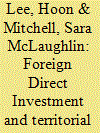

|
|
|
|
|
| Publication |
2012.
|
| Summary/Abstract |
This study evaluates the relationship between foreign direct investment (FDI) and interstate conflict, focusing on four prominent causal mechanisms: the declining benefits of territorial conquest, increasing preference similarity, increasing opportunity costs of violence, and improved information signaling. Empirical analyses show that new territorial issues are less likely to arise as global levels of FDI increase, although monadic and bilateral FDI flows have no effect on states' decisions to start new issue claims. Higher bilateral FDI flows between two disputants significantly reduce the chances for escalation to high levels of violence over issues and improve the chances for peaceful management. Increasing global levels of FDI also reduce the chances for severe militarized conflicts. Opportunity costs are an important mechanism linking FDI and states' conflict management practices, as the pacifying effect of bilateral and monadic FDI on militarized conflict becomes stronger in dyads with a history of militarization over the issues at stake.
|
|
|
|
|
|
|
|
|
|
|
|
|
|
|
|
| 7 |
ID:
126711
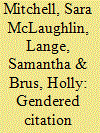

|
|
|
|
|
| Publication |
2013.
|
| Summary/Abstract |
This paper applies a methodology utilized in economics to study citation patterns in two International Studies Association journals. The paper analyzes articles published in International Studies Quarterly (ISQ) and International Studies Perspectives (ISP) in 2005. Comparisons are made based on the sex of the authors of articles and the sex of the cited authors in each paper's bibliography. Empirical analyses suggest that male authors of ISQ and ISP articles are less likely to cite work by female scholars in comparison with female authors. Mixed-gender author teams are also significantly less likely to cite research by female scholars relative to female article authors.
|
|
|
|
|
|
|
|
|
|
|
|
|
|
|
|
| 8 |
ID:
099759
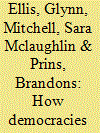

|
|
|
|
|
| Summary/Abstract |
Some studies find that democratic states are more amenable to third party forms of conflict management, while other studies indicate that democracies are able to resolve contentious issues on their own through bilateral negotiations. Using data from the Issue Correlates of War (ICOW) Project, the authors investigate peaceful and militarized conflict management strategies that democratic states employ to resolve contentious issues. Theoretically, the authors focus on how militarized conflict history, relative capabilities, and issue salience influence the tools of conflict management employed by democratic states. Empirical analyses suggest that democratic dyads employ bilateral negotiations more often to resolve contentious issues when the issue has not been militarized previously, when the issue is more salient, and when democratic states face equal adversaries. Democratic dyads seek out nonbinding third party settlement more frequently in situations of power preponderance than nondemocratic dyads, although binding forms of third party settlement occur most often in relatively equal democratic dyads. When it comes to the use of force, democratic states are much less likely than their authoritarian counterparts to militarize an issue claim when little or no armed conflict characterizes the relationship. However, democratic leaders show a willingness to confront force with force. After one militarized dispute, democratic states are no different in their conflict propensity than autocratic states.
|
|
|
|
|
|
|
|
|
|
|
|
|
|
|
|
| 9 |
ID:
100272


|
|
|
|
|
| Publication |
2010.
|
| Summary/Abstract |
Some studies find that democratic states are more amenable to third party forms of conflict management, while other studies indicate that democracies are able to resolve contentious issues on their own through bilateral negotiations. Using data from the Issue Correlates of War (ICOW) Project, the authors investigate peaceful and militarized conflict management strategies that democratic states employ to resolve contentious issues. Theoretically, the authors focus on how militarized conflict history, relative capabilities, and issue salience influence the tools of conflict management employed by democratic states. Empirical analyses suggest that democratic dyads employ bilateral negotiations more often to resolve contentious issues when the issue has not been militarized previously, when the issue is more salient, and when democratic states face equal adversaries. Democratic dyads seek out nonbinding third party settlement more frequently in situations of power preponderance than nondemocratic dyads, although binding forms of third party settlement occur most often in relatively equal democratic dyads. When it comes to the use of force, democratic states are much less likely than their authoritarian counterparts to militarize an issue claim when little or no armed conflict characterizes the relationship. However, democratic leaders show a willingness to confront force with force. After one militarized dispute, democratic states are no different in their conflict propensity than autocratic states.
|
|
|
|
|
|
|
|
|
|
|
|
|
|
|
|
| 10 |
ID:
171287


|
|
|
|
|
| Summary/Abstract |
Recent studies identified gendered citation gaps in political science journal articles, with male scholars being less likely to cite work by female scholars in comparison to their female peers. Although journal editors, editorial boards, and political scientists are becoming more aware of implicit biases and adopting strategies to remedy them, we know less about the proper baselines for citations in subfields and research areas of political science. Without information about how many women should be cited in a research field, it is difficult to know whether the distribution is biased. Using the gender distribution of membership in professional political science organizations and article authors in 38 political science journals, we provide scholars with suggested minimum baselines for gender representation in citations. We also show that women represent a larger share of organization members than the authors in sponsoring organizations’ journals.
|
|
|
|
|
|
|
|
|
|
|
|
|
|
|
|
| 11 |
ID:
080980


|
|
|
|
|
| Publication |
2008.
|
| Summary/Abstract |
Regional and global intergovernmental organizations have grown both in number and scope, yet their role and effectiveness as conflict managers is not fully understood. Previous research efforts tend to categorize organizations solely by the scope of their membership, which obscures important sources of variation in institutional design at both the regional and global levels. International organizations will be more successful conflict managers if they are highly institutionalized, if they have members with homogeneous preferences, and if they have more established democratic members. These hypotheses are evaluated with data on territorial (1816-2001), maritime (1900-2001), and river (1900-2001) claims from the Issue Correlates of War (ICOW) project in the Western Hemisphere, Europe, and the Middle East. Empirical analysis suggests that international organizations are more likely to help disputing parties reach an agreement if they have more democratic members, if they are highly institutionalized, and when they use binding management techniques
|
|
|
|
|
|
|
|
|
|
|
|
|
|
|
|
| 12 |
ID:
137032
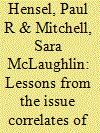

|
|
|
|
|
| Summary/Abstract |
We present lessons and best practices for conflict data collection from the experiences of the ICOW project. Lessons include the development of a search strategy for potential events, the consultation of a broad range of sources, and recognition of the limitations of these sources. More general best practices address the development of detailed instructions for coders, detailed descriptions for data users, and strategies for managing research assistants and preserving project documentation.
|
|
|
|
|
|
|
|
|
|
|
|
|
|
|
|
| 13 |
ID:
133146
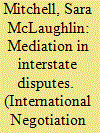

|
|
|
|
|
| Publication |
2014.
|
| Summary/Abstract |
This commentary provides a brief summary of the articles in this special issue and emphasizes four questions raised by this research: 1) ways to define and measure mediators' strategies, 2) teasing out demand side factors from supply side factors in mediation, 3) capturing differences between states and international organizations as conflict managers, and 4) understanding the role of particular conflict management actors like the International Criminal Court.
|
|
|
|
|
|
|
|
|
|
|
|
|
|
|
|
| 14 |
ID:
106934


|
|
|
| 15 |
ID:
117584


|
|
|
|
|
| Publication |
2012.
|
| Summary/Abstract |
We report the results of hypotheses tests about the effects of several measures of research, teaching, and service on the likelihood of achieving the ranks of associate and full professor. In conducting these tests, we control for institutional and individual background characteristics. We focus our tests on the link between productivity and academic rank and explore whether this relationship reveals a gender dimension. The analyses are based on an APSA-sponsored survey of all faculty members in departments of political science (government, public affairs, and international relations) in the United States.
|
|
|
|
|
|
|
|
|
|
|
|
|
|
|
|
| 16 |
ID:
058798
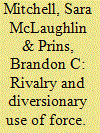

|
|
|
| 17 |
ID:
109581


|
|
|
|
|
| Publication |
2011.
|
| Summary/Abstract |
We develop and test a theory of the supply side of third-party conflict management. Building on Kydd's (2003) model of mediation, which shows that bias enhances mediator credibility, we offer three complementary mechanisms that may enable mediator credibility. First, democratic mediators face costs for deception in the conflict management process. Second, a vibrant global democratic community supports the norms of unbiased and nonviolent conflict management, again increasing the costs of deception for potential mediators. Third, as disputants' ties to international organizations increase, the mediator's costs for dishonesty in the conflict management process rise because these institutions provide more frequent and accurate information about the disputants' capabilities and resolve. These factors, along with sources of bias, increase the availability of credible mediators and their efforts to manage interstate conflicts. Empirical analyses of data on contentious issues from 1816 to 2001 lend mixed support for our arguments. Third-party conflict management occurs more frequently and is more successful if a potential mediator is a democracy, as the average global democracy level increases, and as the disputants' number of shared International Organization (IO) memberships rises. We also find that powerful states serve as mediators more often and are typically successful. Other factors such as trade ties, alliances, issue salience, and distance influence decisions to mediate and mediation success. Taken together, our study provides evidence in support of Kydd's bias argument while offering several mechanisms for unbiased mediators to become credible and successful mediators.
|
|
|
|
|
|
|
|
|
|
|
|
|
|
|
|
| 18 |
ID:
121631
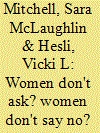

|
|
|
|
|
| Publication |
2013.
|
| Summary/Abstract |
This article examines the dual problems of "women don't ask" and "women don't say no" in the academic profession. First, we consider whether female faculty bargain more or less frequently than male faculty about such resources as salary, research support, clerical support, moving expenses, and spousal accommodation. Analyzing a 2009 APSA survey, we find that women are more likely to ask for resources than men when considering most categories of bargaining issues. This finding goes against conventional wisdom in the literature on gender and bargaining that suggests that women are less likely to bargain than men. Second, we seek to understand if women are reluctant to say no when asked to provide service at the department, college, university, or disciplinary levels. We find that women are asked to provide more service and that they agree to serve more frequently than men. We also find that the service women provide is more typically "token" service, as women are less likely to be asked by their colleagues to serve as department chair, to chair committees, or to lead academic programs. The implications of these results for the leaky pipeline in the academic profession are discussed.
|
|
|
|
|
|
|
|
|
|
|
|
|
|
|
|
|
|
|
|
|